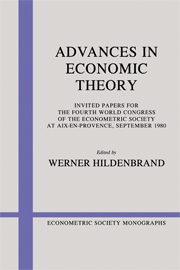Book contents
- Frontmatter
- Part I Economics of incentives
- Part II Information and the market mechanism
- Chapter 3 The role of private information in markets and other organizations
- Part III Non-Walrasian economics
- Part IV Repeated games
- Part V Topics in competitive analysis
- Part VI Applied macroeconomics
- Part VI Industrial organization
Chapter 3 - The role of private information in markets and other organizations
from Part II - Information and the market mechanism
Published online by Cambridge University Press: 05 January 2013
- Frontmatter
- Part I Economics of incentives
- Part II Information and the market mechanism
- Chapter 3 The role of private information in markets and other organizations
- Part III Non-Walrasian economics
- Part IV Repeated games
- Part V Topics in competitive analysis
- Part VI Applied macroeconomics
- Part VI Industrial organization
Summary
Introduction
The notion that competitive markets facilitate the efficient production and allocation of resources in a decentralized manner, that is, without a complete exchange of information among economic agents, is an old one, going back at least to the “socialist controversy” and perhaps to Adam Smith. Phrasing this “conventional wisdom” in this way emphasizes the premise that economic agents come to markets with diverse information that is not publicly available, or at least only at substantial cost. The mention of information implies the prior existence of uncertainty about something, whether that uncertainty be probabilistic or not. I suppose it was to be expected that a rigorous and systematic examination of the conventional wisdom had to await the elaboration of a systematic and rigorous theory of competitive equilibrium under certainty, a process that culminated in the work of Arrow and Debreu.
Although the Arrow-Debreu model was originally put forward for the case of certainty, an ingenious device enabled the theory to be reinterpreted to cover the case of a market in which all relevant future information was to be publicly available, and one could extend to this case, in a natural way, the theorems on the existence and optimality of competitive equilibrium in the case of certainty. Subsequent research, however, has shown that in many cases the presence of private information can prevent a competitive equilibrium from being efficient (given the structure of information), and can even prevent the existence of an equilibrium. This chapter summarizes recent results on two topics in this area: (1) rational expectations equilibrium and the information revealed by prices, and (2) principal-agent and other profit-sharing relationships.
- Type
- Chapter
- Information
- Advances in Economic Theory , pp. 95 - 120Publisher: Cambridge University PressPrint publication year: 1983
- 1
- Cited by

